自考英语二unit_1Text A
- 格式:ppt
- 大小:1.06 MB
- 文档页数:9
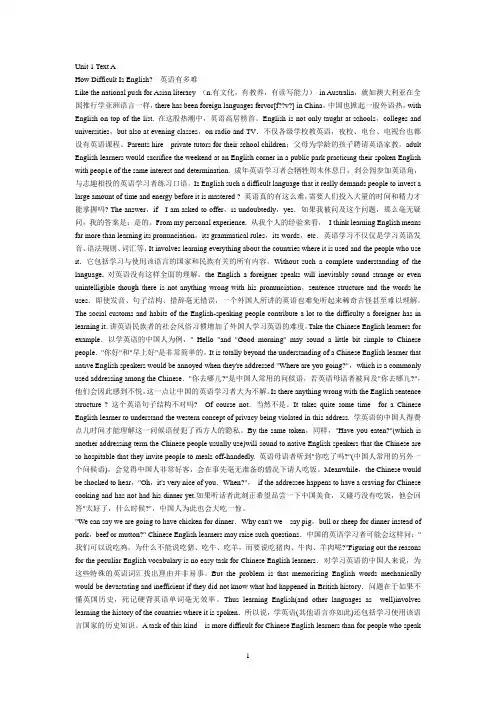
Unit 1 Text AHow Difficult Is English? 英语有多难Like the national push for Asian literacy (n.有文化,有教养,有读写能力)in Australia,就如澳大利亚在全国推行学亚洲语言一样,there has been foreign languages fervor[f??v?] in China,中国也掀起一股外语热,with English on top of the list. 在这股热潮中,英语高居榜首。
English is not only taught at schools,colleges and universities,but also at evening classes,on radio and TV.不仅各级学校教英语,夜校、电台、电视台也都设有英语课程。
Parents hire private tutors for their school children;父母为学龄的孩子聘请英语家教,adult English learners would sacrifice the weekend at an English corner in a public park practicing their spoken English with peop1e of the same interest and determination. 成年英语学习者会牺牲周末休息日,到公园参加英语角,与志趣相投的英语学习者练习口语。
Is English such a difficult language that it really demands people to invest a large amount of time and energy before it is mastered ? 英语真的有这么难,需要人们投入大量的时间和精力才能掌握吗? The answer,if I am asked to offer,is undoubtedly,yes.如果我被问及这个问题,那么毫无疑问,我的答案是:是的。
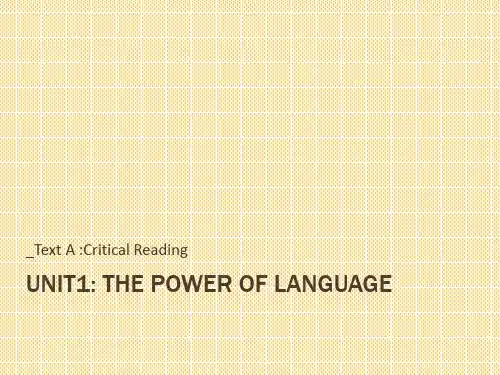
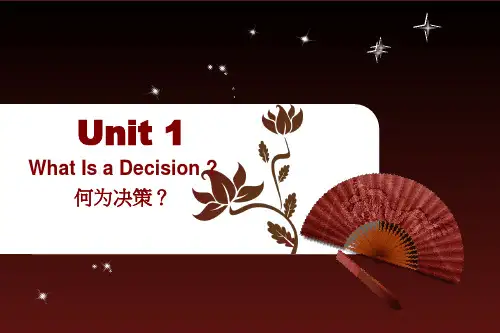

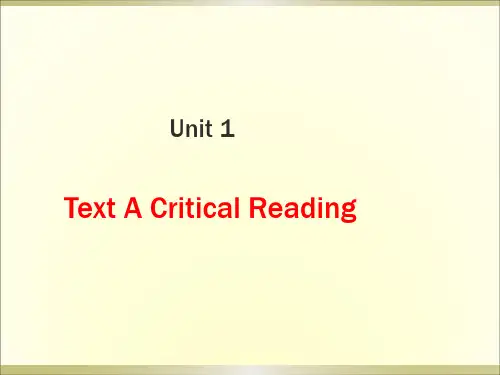
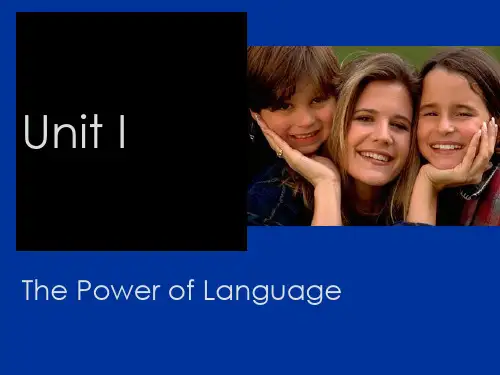
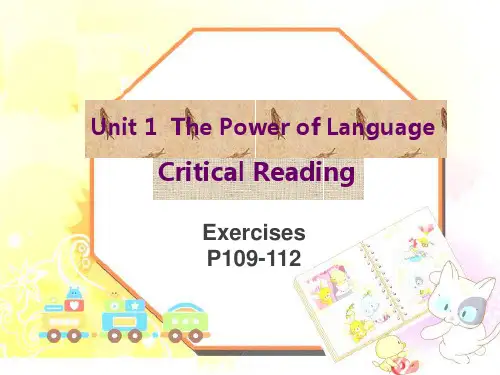
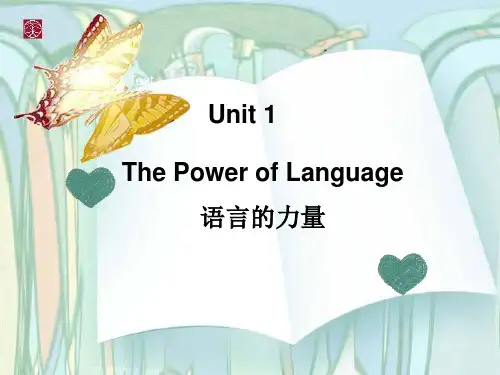
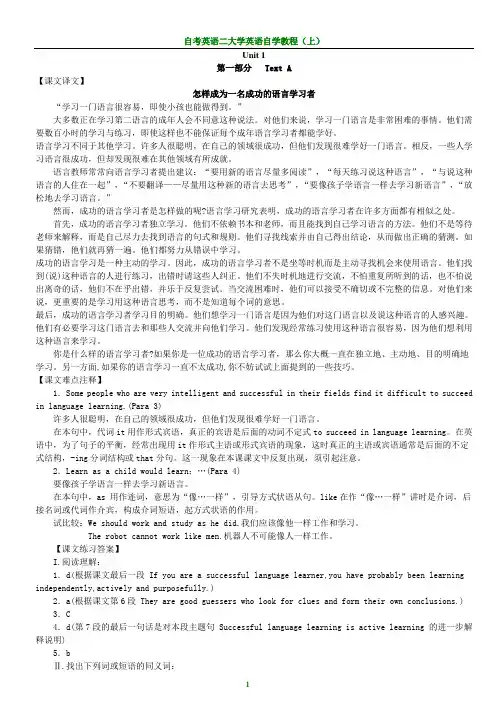
Unit 1第一部分 Text A【课文译文】怎样成为一名成功的语言学习者“学习一门语言很容易,即使小孩也能做得到。
”大多数正在学习第二语言的成年人会不同意这种说法。
对他们来说,学习一门语言是非常困难的事情。
他们需要数百小时的学习与练习,即使这样也不能保证每个成年语言学习者都能学好。
语言学习不同于其他学习。
许多人很聪明,在自己的领域很成功,但他们发现很难学好一门语言。
相反,一些人学习语言很成功,但却发现很难在其他领域有所成就。
语言教师常常向语言学习者提出建议:“要用新的语言尽量多阅读”,“每天练习说这种语言”,“与说这种语言的人住在一起”,“不要翻译——尽量用这种新的语言去思考”,“要像孩子学语言一样去学习新语言”,“放松地去学习语言。
”然而,成功的语言学习者是怎样做的呢?语言学习研究表明,成功的语言学习者在许多方面都有相似之处。
首先,成功的语言学习者独立学习。
他们不依赖书本和老师,而且能找到自己学习语言的方法。
他们不是等待老师来解释,而是自己尽力去找到语言的句式和规则。
他们寻找线索并由自己得出结论,从而做出正确的猜测。
如果猜错,他们就再猜一遍。
他们都努力从错误中学习。
成功的语言学习是一种主动的学习。
因此,成功的语言学习者不是坐等时机而是主动寻找机会来使用语言。
他们找到(说)这种语言的人进行练习,出错时请这些人纠正。
他们不失时机地进行交流,不怕重复所听到的话,也不怕说出离奇的话,他们不在乎出错,并乐于反复尝试。
当交流困难时,他们可以接受不确切或不完整的信息。
对他们来说,更重要的是学习用这种语言思考,而不是知道每个词的意思。
最后,成功的语言学习者学习目的明确。
他们想学习一门语言是因为他们对这门语言以及说这种语言的人感兴趣。
他们有必要学习这门语言去和那些人交流并向他们学习。
他们发现经常练习使用这种语言很容易,因为他们想利用这种语言来学习。
你是什么样的语言学习者?如果你是一位成功的语言学习者,那么你大概一直在独立地、主动地、目的明确地学习。
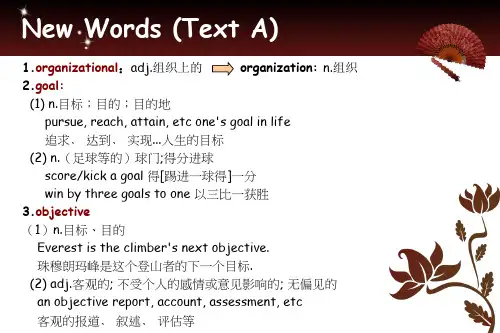
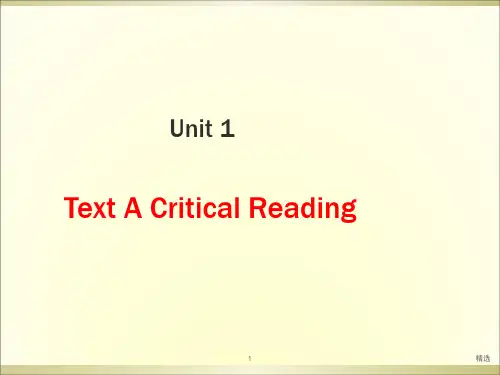
Unit 1Text AI 1-5 B A D A BII Section A1. consistent2.statement3.reflect4.invalid5.considerableparisonSection B1.credible.2.identify3.assumption4.represents5.evaluated6.appropriateSection C1.to2.forward3.into4.in5.with6.toIII 1-5 define action tears good express6-10 powerful internally respond to shapes personalIV Section A1. take different social groups into account2. Comparing his present work with the previous work,3. is inconsistent with what he told the policeman4. is not relevant to what we’re dealing with5. Inform us of any of your changesSection B要成为一个灵活的读者,你必须知道如何根据你的阅读目的选择并使用恰当的阅读方式。
知道何时,如何使用不同的阅读风格能使你成为一个灵活的读者。
研究型阅读是灵活的读者为了深度理解偏难的题材时所使用的阅读风格。
当使用此种阅读风格时,你的阅读速度要比平时慢一些。
而且,你要挑战自我,以理解原文。
并且,它还常常需要你阅读不止一遍以深度理解。
有时候,大声朗读也可以加深理解。
V 52134Text BI Section A1-6 Y F Y F Y NGSection B1. Mastering our language2. our lives and destinies3.determination4. power5.live whatever life you desire6. some alternativesII Section A1. confidence2. creative3. eliminate4. dramatically5. significant6.limitSection B1.matter2. commonly3. pleased4. infinite5. command6. impactSection C1.out2. Seems3. on4. within5. in6. overIII Section A1.have a great impact on the country’s future.2.but it matters a lot to me3.but the police is soon in control of the situation4.i have on alternative but let you go5.The final decision is up to the managerSection B职场中,英语具有重要的作用。
Unit l The Power of Language课后习题参考答案Text AI.1.B 2.A3.D4.A5.CII.Section Al.consistent 2.statement 3.reflect 4.invalid5.considerablyparisonSection B1.credible2.identify3.assumptions4.represents5.evaluated6.appropriateSection C1.to2.forth3.into4.on5.with6.toⅢ. 1.define 2.action 3.tears 4.good 5.express6.powerful7.internally8.shapes9.responds to10.personal Ⅳ.Section A1.take the interests of different social groups into accountpare the recent work with the previous work3.was not consistent with his statement to the police4.was not relevant to the matter at hand5.Please inform us of any change of your situationSection B要想成为一位“弹性阅读者”,你需要懂得如何选择和使用与你的阅读目的相符的阅读方式。
懂得何时使用以及如何使用各种阅读方式,就能让你成为“弹性阅读者”。
如果一名“弹性阅读者”的阅读目的是对难度较大的材料进行高层次的理解,那么他要使用的阅读方式就是研究式阅读。
使用研究式阅读方式时,你的阅读速度应当比正常速度慢。
并且在阅读当中,你必须激发自己的潜力去理解该材料。
研究式阅读常常需要你阅读材料不止一遍,以获得高层次的理解。
第1课T e x t AText A Critical ReadingCritical reading applies to non-fiction writing in which the author puts forth a position or seeks to make a statement. Critical reading is active reading. It involves more than just understanding what an author is saying. Critical reading involves questioning and evaluating what the author is saying, and forming your own opinions about what the author is saying. Here are the things you should do to be a critical reader.批判性地阅读批判性阅读适合于那种作者提出一个观点或试图陈述一个说法的纪实类写作。
批判性阅读是积极阅读。
它不仅仅包括理解作者说了些什么,还包括质疑和评价作者的话,并对此形成自己的观点。
成为一名批判性阅读者需要做到以下几点。
Consider the context of what is written. You may be reading something that was written by an author from a different cultural context than (=from) yours. Or, you may be reading something written some time ago in a different time context than yours. In either case, you must recognize and take into account any differences between your values and attitudes and those represented by the author.考虑写作背景。
Pre-reading Questions阅读前问题1. Do you usually challenge the idea an author represents?一。
你通常会质疑作者所代表的观点吗?What do you think is active reading你认为什么是主动阅读2. What suggestions do you expect the author will give on reading critically?2。
你希望作者对批判性阅读有什么建议?Critical Reading批判性阅读Critical reading applies to non-fiction writing in which the author puts forth a position or seeks to make a statement.批判性阅读适用于作者提出立场或试图发表声明的非小说写作。
Critical reading is active reading.批判性阅读是主动阅读。
It involves more than just inderstanding what an author is saying.它涉及的不仅仅是理解一个作者在说什么。
Critical reading involves questioning and evaluating what the author is saying, and forming your own opinions about what the author is saying.批判性阅读包括质疑和评价作者所说的话,并形成自己对作者所说的话的看法。
Hereare the things you should do to be a critical reader作为一个批判性的读者,你应该做以下几件事Consider the context of what is written.考虑一下所写内容的上下文。